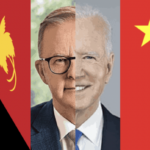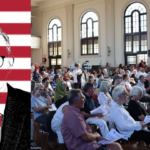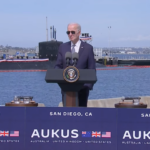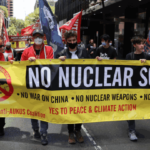Howard’s Greenlighting of Iraq Looms Ominously, So It’s Hardly Surprising Files Are Missing
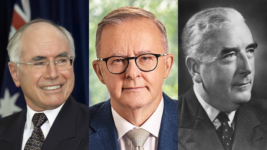
With the UK troubled at home and unable to maintain its presence in Asia, then Labor PM John Curtin announced to Australia in December 1941 that, in the midst of the Second World War, the nation was turning to the US as a superior power of which to follow the lead and seek protection.
And as the National Archives of Australia (NAA) this week released some of the 2003 Howard cabinet papers covering the decision being made to join the US invasion of Iraq, it should be remembered that the Australian Defence Force has followed Washington into eight foreign battles since WWII.
Arguably, then Liberal PM Robert Menzies went a long way to committing us to future US-led wars when he entered into the 1951 ANZUS pact with Washington and Wellington. And despite any US military assistance involved being nonbinding, this potential support was reason to enter Vietnam.
Ten years after the fact, former PM John Howard noted that joining the Iraq War was “the most controversial foreign policy” decision he ever made. Yet, newly released minutes reveal that cabinet gave the go-ahead based solely on his oral submissions regarding Iraqi weapons of mass destruction.
Indeed, Howard greenlighted Iraq despite huge domestic opposition. And not only does this new year revelation remind us that Canberra is itching to embroil us in a war on China, but also it seems in any broader conflict in the Mid East and, as Iraq suggests, justice has no bearing on such decisions.
Disarming lies
Released on 1 January, Cabinet Minute Iraq: Authority for Australian Defence Force Military Action is dated 18 March 2003. And it notes that then US president George W Bush had requested we join the “coalition of the willing” in war against Iraq if it refused to disarm its weapons of mass destruction.
The minute explains that Howard had briefed the cabinet on talks with Bush and then UK PM Tony Blair regarding the need to disarm Iraqi WMDs, and it was the threat of these since-established non-existent weapons, which 70 UN inspections couldn’t locate, that was behind the decision to join.
Further points noted include Iraq’s possession of WMD being in violation of the terms of the UN Security Council, that it weakens global prohibitions, that such weapons could be used to threaten Australia and that 12 years of international sanctions had not prevented Iraq acquiring WMD.
A memorandum that had been circulating amongst various government departments, including the Attorney General’s Department and Department of Foreign Affairs and Trade concluded that the use of force to disarm WMD would be consistent “with Australia’s obligations under international law”.
And in considering all these points, the cabinet resolved to commit the Australian Defence Force to military action in Iraq, and that such deployment would remain under Australian national command, whilst the Australian commander would be integrated into the US Central Command.
Withholding files
Section 31 of the Archives Act 1983 (Cth) stipulates that the NAA must make Commonwealth records transferred to it available. The usual period for such release is 20 years after year of creation. Although exceptions exist under section 33, including for potential damage to security or defence.
But this year’s NAA annual cabinet paper release was notable in that no written briefings from the National Security Committee (NSC), which is the select ministerial body that decides on whether to enter a foreign conflict, have been released, including the costs analysis of engagement.
These documents weren’t held back by the NAA, however, as it was the Department of Prime Minister and Cabinet that failed to transfer them as required by the Act. So, whilst the abovementioned minute outlining the broad decision is available, all the prior files are missing.
Such was the stir over these documents not being made available last Monday, that Anthony Albanese addressed the matter in a 3 January press conference, in which the prime minister set out that the PM’s office hands documents over to the NAA three years in advance of their release.
So, according to the Labor leader, it was then PM Scott Morrison’s office that neglected to hand over the NSC notes without explanation. A total of 78 files weren’t forwarded on by the former Liberal leader, who is known for his having had a predilection for making up his own rules whilst in office.
“The public service have now… provided the remaining documents” to the NAA and the head of PMC “has commenced an independent review… as to how this failure in 2020 to provide all the appropriate documentation occurred,” the prime minister assured the public.
Iraq no more
Of course, Albanese didn’t mention it was lies and alliances that drew the nation into Iraq, and how that might reflect on current questions of foreign policy, and nor did he ponder the belligerence of Howard in ignoring the want of the people or how that triggers similarities with his administration.
Established by Howard in 1996, the National Security Committee is a body made up of the PM and key cabinet ministers, who, amongst other things, hold war powers or make the decision as to whether the nation enters into a foreign theatre of conflict.
Right now, Albanese, defence minister Richard Marles, foreign minister Penny Wong, treasurer Jim Chalmers, energy minister Chris Bowen, attorney general Mark Dreyfus, home affairs minister Clare O’Neil, finance minister Katy Gallagher and defence industry minister Pat Conroy make up the NSC.
But as the PM selects the ministers, its basically up to the office bearer to make the call.
Federal Labor had promised to put this centuries-old British royal practice to review on election, due to pressure from forces like Australians for War Powers Reform, who argue that it should be a whole-of-parliament decision.
AWPR spokesperson Dr Alison Broinowski has explained to Sydney Criminal Lawyers that allowing parliament to debate a decision on whether to enter into a foreign conflict directly involves all members and senators in the decision and hence, triggers the opinions of their constituents.
Albanese, however, ran the inquiry and then killed the reform. Marles wrote to the committee advising it not to recommend the change early on, and prior to the review report doing just that, Wong told parliament that no reform would be forthcoming.
The Albanese government did deliver a compromise though, which entails a parliamentary debate post the NSC making a decision to enter into war.
Morrison established AUKUS. But it’s been Albanese who’s run with it. A $368 billion price tag agreed to, that, as Rex Patrick’s shown, also sees us involved in nuclear proliferation, as not only are we facilitating development of our own subs, but further, that of US ballistic nuclear missile subs.
The people didn’t agree to Iraq. Nor did they sign off on AUKUS or its price or forthcoming austerity. The public isn’t being consulted on the ongoing build up to war with China, and the current lack of consideration of public opinion on whether to enter a newly emerging conflict is par for the course.
Despite the stabilising with Beijing histrionics, recent legislative developments that tear down military trade barriers between the AUKUS powers and see our nation becoming more firmly integrated into the US military-industrial complex, clearly show war on China is still on the agenda.
Right now, regardless of our decision not to deliver a ship to the Red Sea to assist in the US-led Operation Prosperity Guardian, Albanese has sent eleven ADF personnel to be a part of the coalition of nations aiming to curb Houthi military action taken in solidarity with the Palestinians of Gaza.
So, not only does it seem that Albanese has potentially made us all complicit in the decision to support Israel as it perpetrates a wholesale massacre on the Palestinians, but in any resulting broader conflict, we will undoubtedly follow the US lead with its unbreakable alliance with Israel.
And now our PM has seen fit to issue a 4 January cease-and-desist threat to the Houthis, in conjunction with US president Joe Biden and eleven other vassal state leaders.
“We remain committed to the international rules-based order and are determined to hold malign actors accountable for unlawful seizures and attacks,” the heads of various states warned the Yemeni militia on Thursday.


